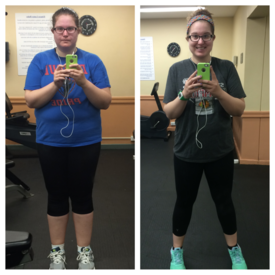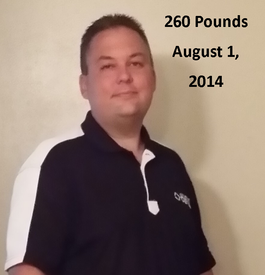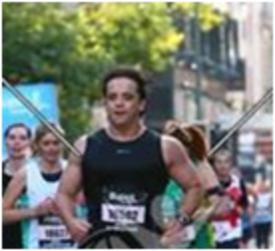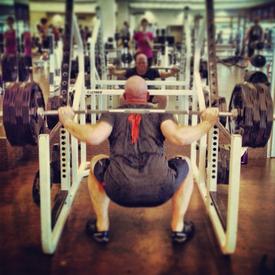Fat burning question

mbakken90
Posts: 202 Member
I heard that if you workout at a heart rate that is too much, you burn fat slower..is that true? I think that may be my problem.
0
Replies
-
*BUMP*0
-
Not true. A greater percentage of your burn comes from fat at lower heart rates, but so much more burn happens at higher heart rates that you burn more fat in total. Plus there are numerous cardiovascular benefits to working above your target heart range, and you continue to burn fat at a higher rate for longer after you finish exercising.0
-
there have been lots of research lately suggesting doing high intensity interval training (HIIT)...where you have work intervals near max HR and rest intervals where your HR drops....is great for fat burning. google HIIT and check it out.0
-
No, it's a common point of confusion that comes from the "fat burn zone" stuff.
In the fat burn zone, a higher percentage of the burn is "fat burn".
In a higher zone, a lower percentage is "fat burn", but since you're burning more overall, the fat burn is still greater overall.0 -
I heard that if you workout at a heart rate that is too much, you burn fat slower..is that true? I think that may be my problem.
I've heard that too and I'd like to know the answer as well.
I actually have a harder time maintaining a lower heart rate than I do just letting myself go at whatever rate feels good.0 -
-
Nope. It's as simple as: Higher heart rate == more calories burned == more fat burned. Plus with higher heart rate you're improving your cardio even better. There is no reason to go slow unless you are physically unable or are simply unwilling to. Not that low intensity exercise is bad by any means of course.0
-
I heard higher cardio is great for your heart but burns fat slower...and if you're at an average heart rate...it burns fat faster.0
-
I've heard you burn more after the workout.0
-
Not true. A greater percentage of your burn comes from fat at lower heart rates, but so much more burn happens at higher heart rates that you burn more fat in total. Plus there are numerous cardiovascular benefits to working above your target heart range, and you continue to burn fat at a higher rate for longer after you finish exercising.
well said ^this^0 -
not true at all. the harder you work the more cals you burn the more weight you lose. there is a lower HR where a higher % of cals are from fat, but you burn so many less caloires that you burn less total calories and less calories from fat.
As an example say in the fat burning zone for 30 minutes you burn 240 cals 60% from fat. go to the cardio zone for the same 30 minutes and burn 390 cals 45% from fat, what do you get: fat burning zone you burn 144 cals from fat (.6*240) in the cardio zone you burn 176 cals from fat (390*.45).
The higher intensity will also give you more benefit when it comes to fitness and cardiovascular health.0 -
here's one article on the differences between steady rate cardio as compared with HIIT. notably, I don't agree with everything in this article, but it presents the basic concept pretty well.
http://www.iwantsixpackabs.com/my_video_tips/interval_training.html
here's the blog I wrote on the HIIT that I do:
http://www.myfitnesspal.com/blog/H_Factor/view/short-and-efficient-work-out-ideas-1569060 -
I've heard you burn more after the workout.
With HIIT, after working out, you will continue to burn calories at a higher rate than you would with moderate training, but the rate will not exceed the rate at which you were burning during the HIIT.0 -
Worrying about how much fat is being burned while running is like worrying about how much muscle is being built while lifting weights.0
-
I heard higher cardio is great for your heart but burns fat slower...and if you're at an average heart rate...it burns fat faster.
Did you read the replies before you asked the same question again?0 -
I believe its a great debate
 IMO, you need both, low moderate and HIIT, both have their benefits and both are still good for you. Sometimes people just don't have 2 hours to workout to stay in a lower HR zone, so HIIT is good, other benefits are received from long and slower. 0
IMO, you need both, low moderate and HIIT, both have their benefits and both are still good for you. Sometimes people just don't have 2 hours to workout to stay in a lower HR zone, so HIIT is good, other benefits are received from long and slower. 0 -
it all comes back to more calories out vs in... for me, i notice less fat on my body when all i do is tons and tons of power walking, when my hr rarely gets over 145, however, the scale goes down a lot more while i do higher intensity workouts where my hr is above 160 bpm.
I also notice that i my total amount of calories are lot less when all i do is power walk vs. higher intensity aerobic activity.0 -
I totally know what it's like to want to get the EXACT answers to your "what if's" or "I heard" but honestly just getting your heart rate up in general, is going to help you lose weight. Yes, there are truths to interval training and it's always a great thing to be educated, but as long as your focused on calories in/calories out you're going to lose weight! Just make sure to mix in some strength training in your routine to build muscle and tone up, because muscle will help you burn fat faster.
Happy losing!0 -
I heard that if you workout at a heart rate that is too much, you burn fat slower..is that true? I think that may be my problem.
It's not worth worrying about. If you are having problems with fat loss then the main culprit is likely to be your diet and the current deficit you are running (or may not be depending how accurate your calorie logging is in reality.)
I was going to write a long post about the fat burning zone but then decided just to nick the following by another user, Azdak:
"the fundamental idea behind the "fat burning" zone has been disproven and others reading this topic might make changes to their exercise routine that would be detrimental, under the mistaken idea that they were "burning more fat".
The body uses a mixture of fuel substrates -- primarily fats and carbohydrates--during exercise. The ratio of fats:carbs is determined primarily by the intensity of the workout. At lower intensities one burns a higher percentage of fat--that percentage decreases as intensity increases.
However, the type of fuel burned during exercise and the amount of fat burned during exercise has virtually NO EFFECT on oxidizing (burning up) stored body fat. Studies have shown pretty definitively that total fat oxidation over 24 hours is not affected by how much fat was "burned" during exercise. In other words, someone who burns more fat during exercise will burn less the rest of the day and vice versa--the body compensates so that, after 24 hours, total fat oxidation is the same.
The primary stimulus that causes the body to burn more fat is the maintenance of a negative energy balance--i.e. taking in fewer calories than you expend. Exercise helps by burning a large number of calories and contributing to the caloric deficit.
A balanced and effective workout program should include lower-intensity endurance training, medium-intensity tempo training and high-intensity interval training. That will help you maximize your calorie burn and give you the best chance to lose body fat."0 -
I heard higher cardio is great for your heart but burns fat slower...and if you're at an average heart rate...it burns fat faster.
Did you read the replies before you asked the same question again?
It wasn't the same question I was just stating something...0 -
bump0
-
I heard that if you workout at a heart rate that is too much, you burn fat slower..is that true? I think that may be my problem.
It's not worth worrying about. If you are having problems with fat loss then the main culprit is likely to be your diet and the current deficit you are running (or may not be depending how accurate your calorie logging is in reality.)
I was going to write a long post about the fat burning zone but then decided just to nick the following by another user, Azdak:
"the fundamental idea behind the "fat burning" zone has been disproven and others reading this topic might make changes to their exercise routine that would be detrimental, under the mistaken idea that they were "burning more fat".
The body uses a mixture of fuel substrates -- primarily fats and carbohydrates--during exercise. The ratio of fats:carbs is determined primarily by the intensity of the workout. At lower intensities one burns a higher percentage of fat--that percentage decreases as intensity increases.
However, the type of fuel burned during exercise and the amount of fat burned during exercise has virtually NO EFFECT on oxidizing (burning up) stored body fat. Studies have shown pretty definitively that total fat oxidation over 24 hours is not affected by how much fat was "burned" during exercise. In other words, someone who burns more fat during exercise will burn less the rest of the day and vice versa--the body compensates so that, after 24 hours, total fat oxidation is the same.
The primary stimulus that causes the body to burn more fat is the maintenance of a negative energy balance--i.e. taking in fewer calories than you expend. Exercise helps by burning a large number of calories and contributing to the caloric deficit.
A balanced and effective workout program should include lower-intensity endurance training, medium-intensity tempo training and high-intensity interval training. That will help you maximize your calorie burn and give you the best chance to lose body fat."
Thank you, as I'm reading through the replies I'm wondering why people have forgotten the other side of the entire equation? You know the food side? Work out as hard as you want. You won't be getting anywhere if you don't eat properly.0 -
I heard that if you workout at a heart rate that is too much, you burn fat slower..is that true? I think that may be my problem.
It's not worth worrying about. If you are having problems with fat loss then the main culprit is likely to be your diet and the current deficit you are running (or may not be depending how accurate your calorie logging is in reality.)
I was going to write a long post about the fat burning zone but then decided just to nick the following by another user, Azdak:
"the fundamental idea behind the "fat burning" zone has been disproven and others reading this topic might make changes to their exercise routine that would be detrimental, under the mistaken idea that they were "burning more fat".
The body uses a mixture of fuel substrates -- primarily fats and carbohydrates--during exercise. The ratio of fats:carbs is determined primarily by the intensity of the workout. At lower intensities one burns a higher percentage of fat--that percentage decreases as intensity increases.
However, the type of fuel burned during exercise and the amount of fat burned during exercise has virtually NO EFFECT on oxidizing (burning up) stored body fat. Studies have shown pretty definitively that total fat oxidation over 24 hours is not affected by how much fat was "burned" during exercise. In other words, someone who burns more fat during exercise will burn less the rest of the day and vice versa--the body compensates so that, after 24 hours, total fat oxidation is the same.
The primary stimulus that causes the body to burn more fat is the maintenance of a negative energy balance--i.e. taking in fewer calories than you expend. Exercise helps by burning a large number of calories and contributing to the caloric deficit.
A balanced and effective workout program should include lower-intensity endurance training, medium-intensity tempo training and high-intensity interval training. That will help you maximize your calorie burn and give you the best chance to lose body fat."
Thank you, as I'm reading through the replies I'm wondering why people have forgotten the other side of the entire equation? You know the food side? Work out as hard as you want. You won't be getting anywhere if you don't eat properly.
I totally agree and thanks for pointing that out. I was just wondering strictly on the workout side though..but I agree it's an important factor.0 -
Agree with what has been said so far.
However, one advantage of lower intensity cardio that rarely gets mentioned is that you can carry on for longer and it's generally, depending on what you do, less draining on the body.
From personal experience, I can burn up to 900 calories in a one hour hard spinning session or doing an hour of P90X Plyo. But I can burn the same walking at 4mph around my local, hilly area for a couple of hours. True, the former are better for my cardio health and are far more time-efficient. But I can walk 5 or 6 days a week before I need a rest day. If I tried that with spinning or plyo I'd have bad knees or wasted, unrecovered muscles in no time.
A mix of activities and styles of cardio is undoubtedly the best option overall. (Plus diet and weights, of course ) 0
) 0 -
Thanks James. Great Post!0
-
I incorporate moderate and HIIT for all my clients. You can't always do HIIT because it is rough on the nervous system. And moderate doesn't increase your resting metabolic rate. So mixing the 2 is a good combination along with a good calorie deficit.
A.C.E. Certified Personal Trainer
IDEA Fitness member
Kickboxing Certified Instructor
Been in fitness for 28+ years and have studied kinesiology and nutrition0 -
Lower heart rates, which are below your anaerobic threshold, your body is utilizing a higher percentage of fat for energy. As your heart rate approaches your Ae Threshold, the more glycogen (sugar) is used as a fuel source. Eventually, your body will be fueling itself with only glycogen, which your body has a limited supply of. Once it runs out, It's like your car running out of anti-freeze. Bad things start to happen, lol.
You're probably wondering how to figure out your Ae? Go take a V02 Max test, everyone's threshold is different.0
This discussion has been closed.
Categories
- All Categories
- 1.4M Health, Wellness and Goals
- 397K Introduce Yourself
- 44.2K Getting Started
- 260.9K Health and Weight Loss
- 176.3K Food and Nutrition
- 47.6K Recipes
- 232.8K Fitness and Exercise
- 456 Sleep, Mindfulness and Overall Wellness
- 6.5K Goal: Maintaining Weight
- 8.7K Goal: Gaining Weight and Body Building
- 153.3K Motivation and Support
- 8.3K Challenges
- 1.3K Debate Club
- 96.5K Chit-Chat
- 2.6K Fun and Games
- 4.5K MyFitnessPal Information
- 16 News and Announcements
- 18 MyFitnessPal Academy
- 1.4K Feature Suggestions and Ideas
- 3.1K MyFitnessPal Tech Support Questions

















